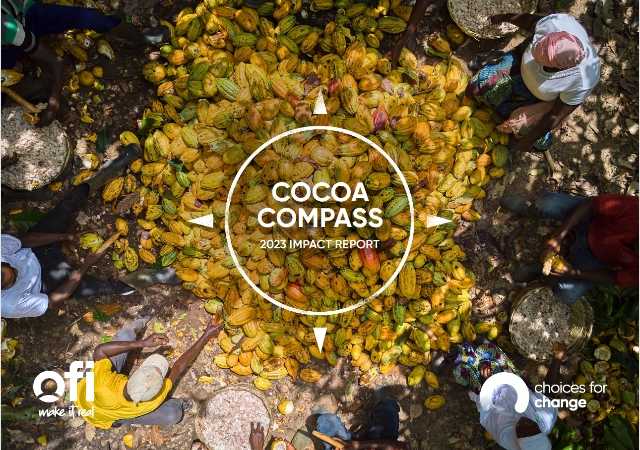LONDON – ofi (olam food ingredients), a global leader in naturally good food and beverage ingredients and solutions, is further enhancing efforts to tackle deforestation and drive regenerative agriculture by achieving seven landscape partnerships and bringing over a million hectares under regenerative agriculture by 2030.
These new targets align with ofi’s company-wide Choices for Change strategy and will be further boosted by the cocoa business’ tree carbon stock target of 15 million trees by 2030, converting as many farms as possible to agroforestry.
This announcement coincides with the release of ofi’s Cocoa Compass Impact Report (2023), which shares the latest sustainability progress from across its cocoa supply chain and builds on the steps taken to protect and restore cocoa landscapes.
Regenerative agriculture highlights since 2018, ofi’s Cocoa Compass baseline, include:
- 8.9 million trees distributed for agroforestry programs by ofi’s cocoa business, working with customers and partners
- 57,000 hectares of land rehabilitated globally
- 970,000 farmers trained in Good Agricultural Practices
ofi’s, Head of Cocoa Sustainability, Andrew Brooks, said: “Greater action and urgency will be needed to address climate change and protect nature and farmer livelihoods in the years to come. Since the launch of Cocoa Compass in 2019, we have now published four years of data and insights from our cocoa sustainability programs, partnerships, and tools, which we are using to raise our regenerative agriculture ambition and focus attention where we can make the greatest difference, including regenerative farming”.
“Change at scale requires industry, national governments, communities and civil society to work together. So, learning from the success of partnerships like RESTORE and LASCARCOCO, we plan to go faster and further by co-developing several new and ambitious multi-stakeholder landscape partnerships that create impact beyond individual programs and help to drive collective action.”
One example is a pioneering project with Mars and the German Development Cooperation (GIZ) in Indonesia, where ofi is implementing 20 hectares of agroforestry plots to test Sloping Agriculture Land Technology (SALT), an innovative technique that involves planting cocoa trees in combination with fruit trees, timber and food crops so the root systems bind the soil on the hillsides and help prevent erosion.
About ofi
ofi (olam food ingredients) is a new operating group born out of Olam Group. ofi offers sustainable, natural, value-added food products and ingredients so that consumers can enjoy the healthy and indulgent products they love.
It consists of industry-leading businesses of cocoa, coffee, dairy, nuts, and spices. ofi has built a unique global value chain presence including its own farming operations, farm-gate origination, and manufacturing facilities. ofi partners with customers, leveraging its complementary and differentiated portfolio of ‘on-trend’ food products, to co-create solutions that anticipate and meet changing consumer preferences as demand increases for healthier food that’s traceable and sustainable.
About Olam Group
Olam Group is a leading food and agri-business supplying food, ingredients, feed and fibre to 22,000 customers worldwide. Our value chain spans over 60 countries and includes farming, processing and distribution operations, as well as a global network of farmers.
Through our purpose to ‘Re-imagine Global Agriculture and Food Systems’, Olam Group aims to address the many challenges involved in meeting the needs of a growing global population, while achieving positive impact for farming communities, our planet and all our stakeholders.
Headquartered and listed in Singapore, Olam Group currently ranks among the top 30 largest primary listed companies in terms of market capitalisation on SGX-ST.
Since June 2020, Olam Group has been included in the FTSE4Good Index Series, a global sustainable investment index series developed by FTSE Russell, following a rigorous assessment of Olam’s supply chain activities, impact on the environment and governance transparency.
More information on Olam can be found here.


















